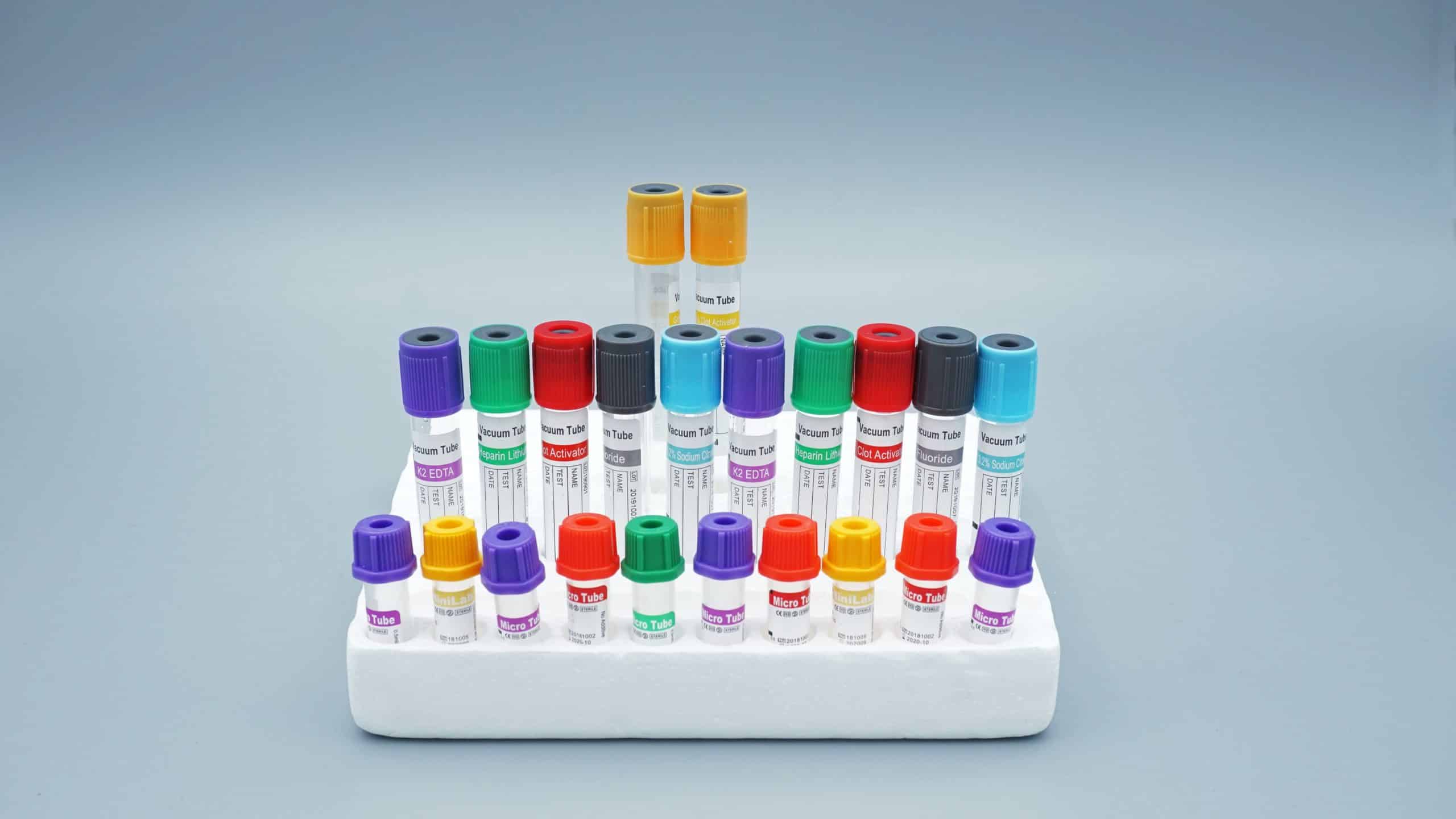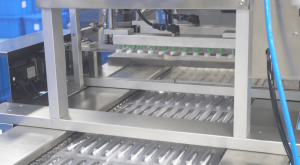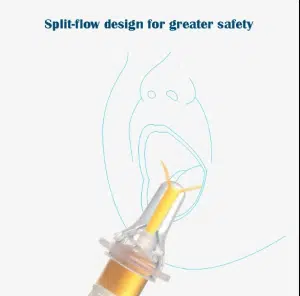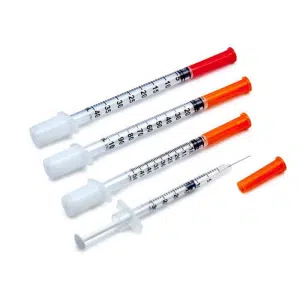What Are Blood Collection Tubes?
Blood collection tubes are sterile, vacuum-sealed containers designed to collect, transport, and store blood samples for laboratory analysis. Each tube contains specific additives that preserve blood components or prevent coagulation, depending on the intended test requirements. The vacuum system ensures consistent sample volume and reduces contamination risk.
Key Components of Blood Collection Tubes:
- Tube Material: High-quality plastic or glass construction
- Vacuum System: Pre-measured negative pressure for accurate sampling
- Additives: Specific chemicals for different test requirements
- Color-Coded Caps: Universal identification system for safety
- Sterile Environment: Gamma or ETO sterilization for contamination prevention
Complete Classification of Blood Collection Tubes
1. Red Top Tubes (No Additive/Clot Activator)
Purpose: Serum collection for chemistry and serology tests Additive: None or silica clot activator Applications:
- Routine chemistry panels
- Liver function tests
- Kidney function tests
- Cardiac enzymes
- Therapeutic drug monitoring
Processing Time: 30-60 minutes clotting time Storage: Room temperature or refrigerated
2. Gold/Yellow Top Tubes (Serum Separator Tubes – SST)
Purpose: Serum separation with gel barrier Additive: Clot activator + separation gel Applications:
- Comprehensive metabolic panels
- Lipid profiles
- Hormone assays
- Tumor markers
- Immunology tests
Key Advantage: Gel barrier prevents serum contamination Processing: Centrifuge after clotting for clean serum separation
3. Purple/Lavender Top Tubes (EDTA)
Purpose: Whole blood collection with anticoagulant Additive: K2EDTA or K3EDTA Applications:
- Complete blood count (CBC)
- Blood typing and crossmatching
- Sedimentation rate (ESR)
- Flow cytometry
- Molecular diagnostics
Critical Factor: Must be mixed immediately after collection Stability: Excellent for hematology parameters
4. Light Blue Top Tubes (Sodium Citrate)
Purpose: Coagulation studies Additive: 3.2% or 3.8% sodium citrate Applications:
- Prothrombin time (PT)
- Partial thromboplastin time (PTT)
- D-dimer testing
- Fibrinogen levels
- Factor assays
Important: 9:1 blood-to-anticoagulant ratio is critical Mixing: Gentle inversion required immediately after collection
5. Green Top Tubes (Heparin)
Purpose: Plasma collection for chemistry tests Additive: Lithium heparin or sodium heparin Applications:
- Emergency chemistry panels
- Blood gas analysis
- Ammonia levels
- Chromosome analysis
- STAT electrolytes
Advantage: Fastest processing time – no clotting required Limitation: Not suitable for coagulation studies
6. Gray Top Tubes (Glucose Preservation)
Purpose: Glucose and lactate testing Additive: Sodium fluoride + potassium oxalate Applications:
- Glucose tolerance tests
- Blood alcohol levels
- Lactate measurements
- Forensic testing
Special Property: Inhibits glycolysis for accurate glucose results Storage: Can maintain glucose levels for extended periods
7. Black Top Tubes (ESR)
Purpose: Erythrocyte sedimentation rate testing Additive: Sodium citrate (different concentration than blue top) Applications:
- ESR testing specifically
- Inflammation monitoring
- Disease activity assessment
Specific Use: Dedicated ESR tubes for optimal results Standard: Westergren method compatibility
Advanced Tube Types for Specialized Testing
8. Dark Blue/Navy Top Tubes (Trace Elements)
Purpose: Heavy metal and trace element analysis Additive: No additive or EDTA (metal-free) Applications:
- Lead level testing
- Mercury analysis
- Zinc and copper levels
- Toxicology studies
Special Feature: Metal-free construction prevents contamination
9. Pink Top Tubes (Blood Banking)
Purpose: Blood bank studies Additive: K2EDTA (similar to purple but different volume) Applications:
- Blood typing
- Antibody screening
- Crossmatching
- Direct antiglobulin test
Distinction: Specifically designed for immunohematology
10. White Top Tubes (Molecular Diagnostics)
Purpose: DNA/RNA preservation Additive: K2EDTA + stabilizing agents Applications:
- PCR testing
- Genetic analysis
- Viral load testing
- Molecular pathology
Innovation: Enhanced nucleic acid stability
Tube Selection Guide by Test Type
Chemistry Tests
- Basic Metabolic Panel: Gold/Red top
- Liver Function: Gold/Red top
- Cardiac Markers: Gold/Red top
- STAT Chemistry: Green top (heparin)
Hematology Tests
- Complete Blood Count: Purple top (EDTA)
- Blood Smear: Purple top (EDTA)
- Platelet Count: Purple top (EDTA)
- ESR: Black top or Purple top
Coagulation Tests
- PT/INR: Light blue top
- PTT: Light blue top
- D-dimer: Light blue top
- Fibrinogen: Light blue top
Special Tests
- Blood Culture: Special culture bottles
- Glucose Testing: Gray top
- Heavy Metals: Dark blue top
- Molecular Testing: White top
Quality Standards and Certifications
International Standards We Meet:
- ISO 6710: Single-use containers for venous blood specimen collection
- CLSI GP39: Collection, transport, and processing of blood specimens
- FDA 510(k): US market clearance
- CE Marking: European conformity
- ISO 13485: Medical device quality management
Quality Control Measures:
- Sterility Testing: Every batch validated
- Vacuum Integrity: Consistent draw volume
- Additive Accuracy: Precise chemical concentrations
- Shelf Life Validation: Extended stability studies
Bulk Procurement Advantages
Volume-Based Pricing Structure:
- 5,000-25,000 tubes: 8-12% discount
- 25,000-100,000 tubes: 12-18% discount
- 100,000+ tubes: 18-25% discount
- Annual contracts: Additional 5-10% savings
Custom Manufacturing Services:
- Private labelingwith your brand identity
- Custom tube sizesfor specific applications
- Specialized additivesfor unique testing requirements
- Color customizationfor institutional preferences
Supply Chain Benefits:
- Consistent availabilitywith strategic inventory
- Just-in-time deliveryto reduce storage costs
- Emergency supplycapabilities for urgent needs
- Global shippingwith temperature-controlled logistics
Best Practices for Healthcare Procurement
1. Needs Assessment
- Calculate monthly usage by tube type
- Identify peak testing periods
- Consider seasonal variations
- Plan for emergency reserves
2. Quality Verification
- Request certificates of analysis
- Verify expiration date management
- Test sample lots before bulk orders
- Ensure cold chain compliance
3. Cost Optimization Strategies
- Bundle purchasingacross tube types
- Long-term contractsfor price stability
- Generic alternativeswhere appropriate
- Waste reductionthrough proper inventory management
4. Supplier Evaluation Criteria
- Regulatory compliancehistory
- Quality managementsystems
- Technical supportcapabilities
- Supply chain reliability
Common Procurement Mistakes to Avoid
Mistake 1: Wrong Tube Selection
Using incorrect tubes can lead to:
- Test result errors (30-70% of lab errors)
- Sample rejection and re-collection costs
- Patient safety risks
- Regulatory compliance issues
Mistake 2: Inadequate Inventory Management
- Expired product waste (2-5% of inventory typically)
- Stockouts during peak periods
- Excessive storage costs
- Temperature excursion losses
Mistake 3: Ignoring Staff Training
- Improper collection techniques
- Incorrect tube order of draw
- Sample contamination issues
- Reduced test accuracy
Storage and Handling Requirements
Environmental Conditions:
- Temperature: 15-25°C (59-77°F)
- Humidity: <60% relative humidity
- Light: Protected from direct sunlight
- Ventilation: Adequate air circulation
Inventory Management:
- FIFO rotation: First in, first out usage
- Expiration tracking: Automated monitoring systems
- Segregation: Separate storage by tube type
- Documentation: Lot tracking and traceability
Emerging Trends in Blood Collection
1. Smaller Sample Volumes
- Pediatric-friendly tubes
- Micro-collection systems
- Point-of-care testing compatibility
2. Enhanced Safety Features
- Needle safety mechanisms
- Breakage-resistant materials
- Tamper-evident closures
3. Sustainability Initiatives
- Recyclable materials
- Reduced packaging waste
- Carbon footprint reduction
ROI Analysis for Bulk Purchasing
Cost Savings Calculation:
Example: 50,000 tubes annually
- Individual purchase: $0.45/tube = $22,500
- Bulk purchase: $0.32/tube = $16,000
- Annual savings: $6,500 (29% reduction)
Additional Benefits:
- Reduced procurement time: 15-20 hours/month
- Lower storage costs: Optimized inventory levels
- Improved cash flow: Extended payment terms
- Risk mitigation: Guaranteed supply availability
Regulatory Compliance Checklist
Documentation Requirements:
- Certificates of Analysis: For each lot received
- Sterility Certificates: Batch-specific documentation
- Material Safety Data Sheets: For safety protocols
- Traceability Records: From manufacturing to patient
Inspection Readiness:
- Supplier audits: Annual quality assessments
- Change control: Documentation of any modifications
- Corrective actions: Response to quality issues
- Training records: Staff competency documentation
Conclusion: Optimizing Your Blood Collection Strategy
Selecting the right blood collection tubes is crucial for accurate diagnostic results and efficient laboratory operations. Understanding the specific applications of each tube type, coupled with strategic procurement practices, can significantly improve both clinical outcomes and cost-effectiveness.
As your trusted medical supplies manufacturer and wholesale partner, we offer comprehensive solutions including:
- Complete tube portfoliocovering all clinical needs
- Custom manufacturingfor specialized requirements
- Quality assurancewith full regulatory compliance
- Supply chain expertisefor reliable delivery
Our commitment to innovation, quality, and customer service makes us the preferred partner for healthcare organizations seeking to optimize their laboratory operations while maintaining the highest standards of patient care.
Ready to Optimize Your Blood Collection Procurement?
Contact our technical sales team for:
- Personalized consultationon tube selection
- Volume pricingtailored to your needs
- Custom solutionsfor unique requirements
- Supply chain optimizationstrategies
Keywords: blood collection tubes, vacuum tubes, phlebotomy supplies, medical laboratory supplies, bulk medical procurement, custom medical tubes, wholesale laboratory equipment






